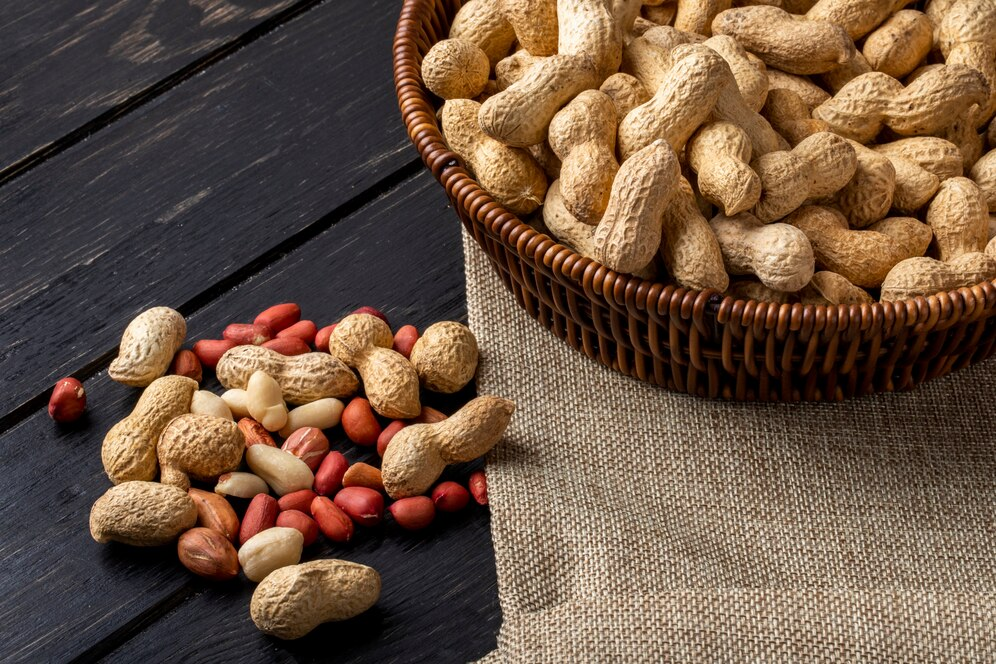While there are several peanut nutrition facts, health experts say eating a wide variety of peanuts promotes weight loss. A legume, such as peanuts, beans, or lentils, is rich in nutrients and has a positive effect on heart health. This is because it contains healthy fats.
On the other hand, there are non-health benefits associated with eating peanuts. Peanuts are also a healthy snack when consumed in moderation.
Become an insider. Subscribe to our newsletter for more top trending stories like this!
6 Peanut Nutrition Facts for a Healthy Lifestyle
According to the National Peanut Board, a serving of peanuts contains 161 calories, 18g of fat, 5.1mg of sodium, 4.6g of carbohydrates, 2.4 g of fiber, 1.3g of sugars, and 9.3g of protein. Below is detailed information on peanut nutrition facts for healthy living.
Carbohydrates
There are 4.6 grams of carbohydrates in an ounce of raw peanuts. It has a glycemic index (GI) of 14, which means it contains a low amount of sugar. As compared with high-GI foods like white bread or cornflakes, peanuts are the least likely to affect your blood sugar levels. In peanuts, about 2 grams of carbohydrates come from fiber, while about 1 gram comes from sugar.
Fats
Each serving of peanuts has 14 grams of fat. However, the fat in peanuts is healthy for the heart. A serving of peanuts contains 6.9 grams of monounsaturated fat, 4.4 grams of polyunsaturated fat, and 1.8g of saturated fat.
When you roast your peanuts, whether oil-roasted, seasoned, or sugar-coated, they provide different amounts of fat. The saturated and fat content of peanuts can be increased by coatings, flavorings, and seasonings.
Protein
The peanut nutrition facts on protein will surprise you! Nuts are a healthy source of protein, including peanuts. An ounce per serving of peanuts—about a handful—contains 7.3 grams of protein high-quality, plant-based protein. As such, you can include peanuts in your nutritious snack.
Unlike animal protein, the protein found in peanuts is plant-based and so contains extra elements that support good health, such as fiber and special bioactive. Arginine is one of the most abundant amino acids in peanuts and is also present in all 20 amino acids.
Fiber
According to the Nutritional Database of the United States Department of Agriculture, peanuts are a good source of fiber. Almost a third of the carbohydrates in peanuts are fiber. According to the 2020–2025 Dietary Guidelines, more than 90% of women and 97% of men do not reach recommended intakes for dietary fiber. Thus, through peanut nutrition facts, you might want to add a few peanuts to your diet.
Vitamins and Minerals
Besides containing vitamins and minerals, peanuts can also provide a number of other health benefits. You can consume these foods to help you absorb the recommended daily value (DV) for a number of vitamins and minerals.
Peanuts are a great source of vitamins and minerals that are essential for the growth and development of your immune system. The nutritional value of peanuts is influenced by a number of micronutrients and bioactive. However, peanuts don’t contain any vitamin A or C, unlike many tree nuts.
Calories
When you serve a single 1-ounce of raw peanuts, you’re serving about 161 calories. When you serve peanuts that are coated with topping, it may change the nutrition facts, but the calories remain the same.
For example, the USDA estimates that a single serving of honey-roasted peanuts has 162 calories. Peanuts include 161 calories, of which 78% are from fat, 18% are from protein, and the remaining calories are from carbohydrates.
Moreover, peanuts contain fiber, protein, and beneficial mono- and polyunsaturated fats. These are not the only peanut nutrition facts. Peanuts supply essential minerals like niacin, vitamin E, manganese, folate, and thiamin.
People Also Read: Recipe: Delicious Binyebwa | Ugandan Groundnut Sauce Recipe
Health Benefits of Eating Peanuts
Beyond their nutritional value, peanuts also include a variety of nutrients that boost your metabolism, help prevent illness, and promote weight loss, including the loss of belly fat. Among the best benefits of peanuts are;
Aids Blood Sugar Control
Although almonds are classified as a healthy snack, it turns out that peanuts have equal advantages for blood sugar regulation. The glycemic index of other meals you eat at the same time can drop significantly by eating peanuts because of their natural fat content. Also, following a meal, peanuts help control postprandial levels and blood sugar levels.
Supports Weight Loss
The protein and fiber in peanuts help you feel full. Possibly, these intriguing results are due, in part, to peanuts’ ability to absorb energy. Even though they provide a lot of calories, peanuts also contain fat that your body cannot fully absorb.
May Reduce the Risk of Heart Disease
Peanuts are rich in unsaturated fatty acids, especially monounsaturated fatty acids, as well as polyunsaturated fatty acids like linoleic acids. These acids improve lipid profiles and lower blood pressure, lowering the risk of cardiovascular disease.
The fiber and heart-healthy lipids in peanuts are also advantageous. If you are watching your blood pressure, you should choose unsalted peanuts.
According to research on American men and women, those who like to eat a 28g portion of peanuts twice a week had a 10%, 15%, and 13% lower probability of having a complete stroke, coronary heart disease, or cardiovascular disease, respectively, than those who never or almost never did.
Hence, eating a balanced plant-based diet that includes lots of nuts, beans, fruits, and vegetables may help you live longer.
May Lower the Risk of Gallstones
When you consume peanuts, your blood cholesterol levels are improved, which may have a protective effect on the development of gallstones.
Gallstones are fluid-filled aggregates that solidify inside the gallbladder and include some partially-dissolved cholesterol. When you consume peanuts in any form five times a week, there’s a 25% decrease in gallbladder disease.
Can Help Relieve Inflammation
Also, it has been demonstrated that foods with low glycemic loading can reduce inflammation. In addition to having a low glycemic index, peanuts are loaded with nutrients that reduce inflammation, such as dietary fiber, arginine, certain fats, antioxidants, and magnesium.
May Reduce Risk of Alzheimer’s Disease
Peanuts are high in vitamins E and B and niacin. In large population studies, niacin from food has been shown to reduce the rate of cognitive decline or dementia in adults over 65.
Although supplements are not as helpful, a high intake of vitamin E through foods like peanuts may reduce Alzheimer’s disease by up to 70%. As such, peanuts provide a winning combination for your brain’s health.
Become an insider. Subscribe to our newsletter for more top trending stories like this!
Join our Spotcovery Global Black Community Facebook Group for early access to exclusive content and to share in a lively discussion.
Other Peanuts Nutrition Facts You Should Know
Salted Peanut Nutrition Facts
The Centers for Disease Control and Prevention (CDC) warn that consuming too much salt can raise blood pressure and put you at risk for heart attacks and strokes. However, salted peanuts are low in calories and sodium, which is good news.
The FDA defines low-sodium foods as those that have less than 140 mg of salt per serving.
Accordingly, peanuts in any form—raw, dry-roasted, or oil-roasted—and the majority of salted peanut varieties meet this standard because the salt in peanuts is surface salt that can rub off on your fingers or through the package.
It’s crucial to remember that peanuts are not among the top five sources of sodium in the average diet.
Roasted Peanut Nutrition Facts
Raw and roasted peanuts have the same number of calories. In contrast, roasted peanut skins, like those of light- or dark-roasted varieties, are very high in nutritional fiber and natural antioxidants.
A study revealed that peanut shells are rich in bioactive components, plant compounds that have been discovered to have health advantages beyond vitamins and minerals. Antioxidants like polyphenols, a type of bioactivity, guard against heart disease, cancer, and stroke.
Boiled Peanut Nutrition Facts
When peanuts are boiled, their phytochemical composition changes significantly, resulting in increased levels of flavonoids and polyphenols. In essence, boiled peanuts contain almost four times as many antioxidants as other varieties of peanuts.
Non-Health Peanut Nutrition Facts
Allergies
At least 1% of people in the United States and between 2% and 5% of children have a peanut allergy, making it one of the most prevalent and potentially severe food allergies. The prevalence of peanut allergies keeps rising every year, especially in kids who have never been exposed to peanuts before.
To that end, the FDA has directed food producers to prominently disclose peanuts on product labels, along with any other common allergens (milk, eggs, fish, shellfish, tree nuts, wheat, and soybeans).
If the product is made at a facility that utilizes nuts in other food products, some producers may write text like “may contain peanuts” on the label. In the event that you have a severe allergy, this can enable you to avoid concealed nuts.
Adverse Effects
There is evidence that resveratrol in peanuts can slow blood clotting when you consume too many peanuts. Blood in the urine (hematuria), nosebleeds, easy bruising, abdominal pain, and heavy menstrual bleeding are all possible adverse effects of blood thinners like Coumadin that may be amplified by this.
It is possible that resveratrol will interact with other medications, making them more harmful. These include:
- Antihistamines used to treat allergies
- Benzodiazepines used to treat anxiety and insomnia
- Calcium channel blockers used to treat high blood pressure
- Erectile dysfunction drugs
- HIV protease inhibitors used to treat HIV infection
- Statins used to treat high cholesterol
People Also Read: 10 Best Morning Routine Ideas to Improve Your Productivity
What Are the Varieties of Peanuts?
Many peanut species are used in producing a variety of goods. 80% of the peanuts produced in the United States are runners, which are primarily utilized to produce commercial peanut butter.
The biggest peanuts are Virginia peanuts, commonly referred to as ballpark peanuts, and they are utilized in gourmet delicacies. Red-skinned Spanish peanuts are commonly used in confections. Valencia peanuts, which can also be boiled and consumed on their own, are typically used to make natural peanut butter.
Peanuts are available in a variety of forms, including in-shell, shelled, raw, dry-roasted, oil-roasted, or coated. Salted or unsalted, chunky or creamy, peanut butter is available. For flavor and to prevent the spread from splitting, some types of peanut butter have added sugar or hydrogenated fats.
Frequently Asked Questions
Q: How many peanuts should I eat per day?
A: The recommended limit for how many peanuts you should eat per day is around 42 grams. This is about 16 peanuts. Eating peanuts in moderation is important as they are high in fat and contain a lot of calories. They are healthy food but should not be eaten in excess.
Q: How healthy are peanuts for you?
A: In particular, peanuts are a great source of fiber, proteins, and beneficial fats. Moreover, they are rich in B vitamins, magnesium, potassium, and phosphorus. Peanuts are nutrient-rich and low in carbs despite having a lot of calories.
Q: How many peanuts should I eat per day?
A: Two tablespoons of peanut butter or a handful of peanuts (between 1 and 2 ounces, depending on size) are effective servings you could adopt.
Q: What is the healthiest way to eat peanuts?
A: You can consume peanuts raw, boiled, roasted, fried, powdered, or make peanut butter out of them. Because the skin contains so many antioxidants and phytochemicals, eating them in their whole form is nutritionally the most beneficial.
Peanuts are more than just a snack!
Nearly 80% of consumers turn to directories with reviews to find a local business. List your business for free in our exclusive Spotcovery Black-Owned Business Directory
Become an insider. Subscribe to our newsletter for more top trending stories like this!





